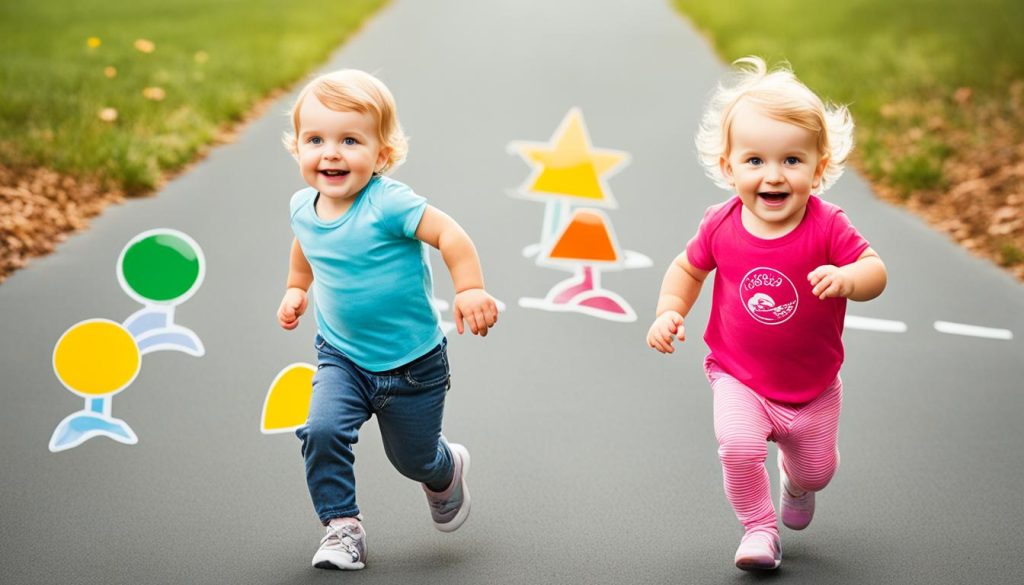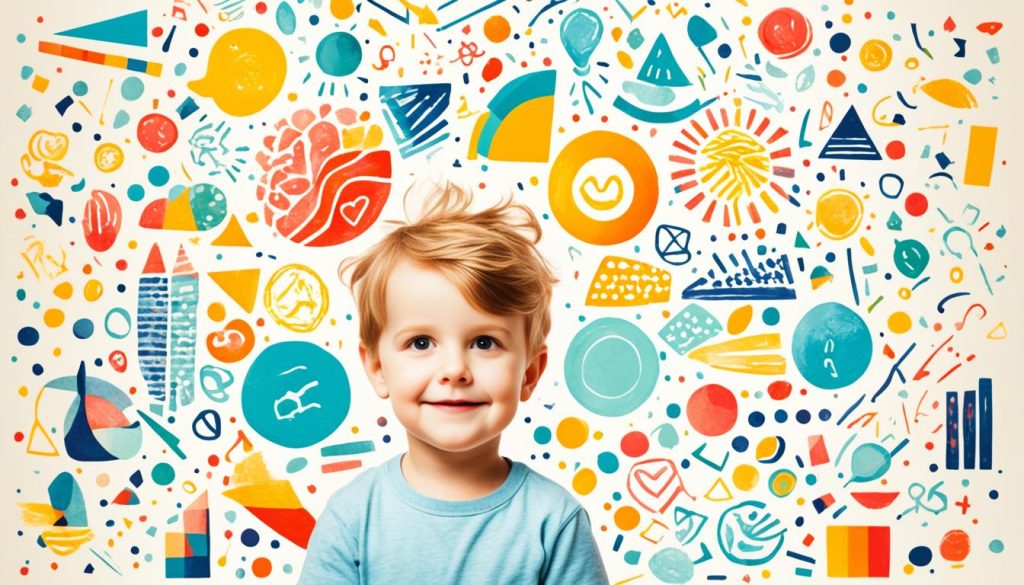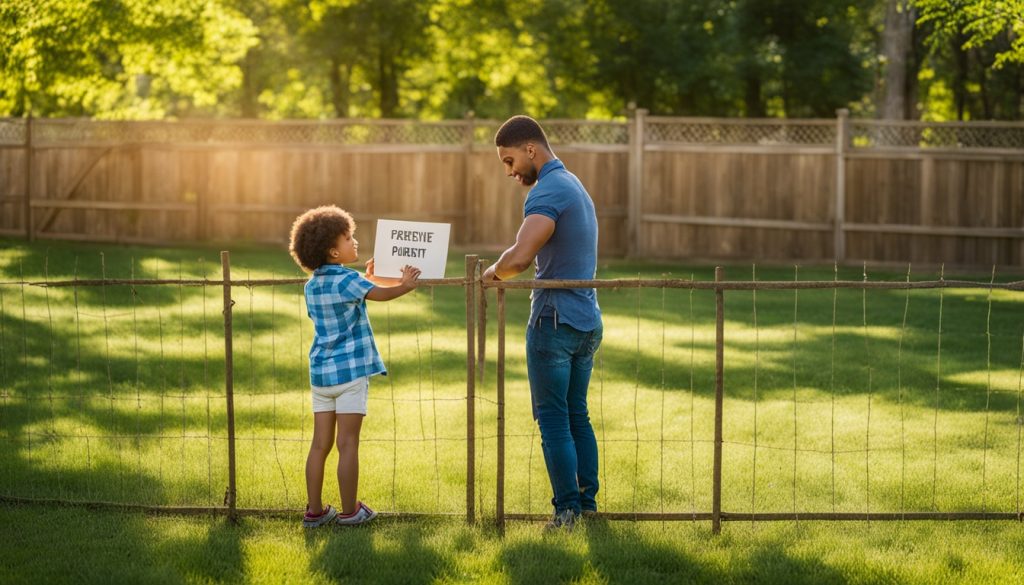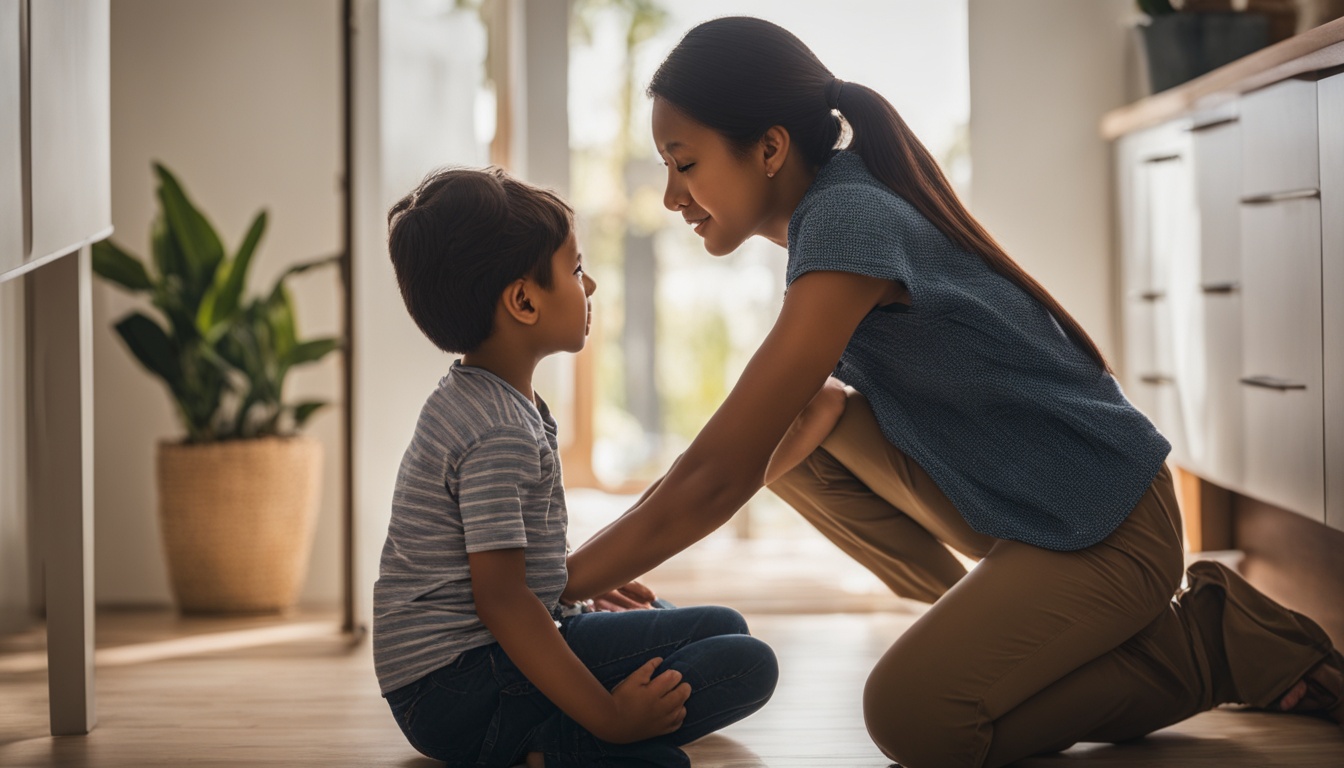Imagine your toddler throws their cereal across the kitchen, making a mess. You feel frustrated, tired, and maybe a bit amused. In these moments, discipline is more than just correcting your child. It’s a key way to help them grow and understand the world.
Positive parenting means using discipline as a guide, not a punishment. It’s based on Adlerian Psychology and Positive Discipline, which have been tested and used in many families. These methods aim to make kids responsible, caring, and independent.
They focus on teaching through patience and guidance, not punishment. Unlike old ways like spanking, positive parenting uses education and care.
So, how do you use these ideas in daily life? Start by setting clear rules that make sense to your child. Spend quality time with them, free from distractions. Use role-playing to teach important life skills.
This way, your child learns to act positively and understands the value of good behavior. By giving them your time and attention, you help them grow emotionally and behave better.
Key Takeaways
- Positive parenting uses discipline to guide, not punish.
- It’s rooted in Adlerian Psychology and Positive Discipline, supported by research.
- These methods focus on long-term behavior improvement.
- Role-playing and setting clear rules help kids learn right from wrong.
- Spending quality, distraction-free time with your child can greatly improve their behavior.
Understanding the Goal of Discipline
Discipline should be seen as a way to teach, not punish. Its main goal is to help kids grow into strong, respectful, and independent people. This method helps kids reach important child development milestones and become caring adults.

The Canadian Paediatric Society suggests a proactive way to discipline, focusing on being consistent and fair. Good discipline comes from an adult who cares for the child and is seen as fair. This method supports fostering child independence and lifelong learning in children.
Effective discipline must fit the child’s age and personality. For young toddlers, setting clear rules is key. Older toddlers need realistic goals and routines. This approach helps raise kind children and teaches them to follow rules.
Doctors are key in giving advice that matches a child’s growth stage. They offer tips on eating, using the toilet, and bedtime routines. Parents should be consistent in discipline to build trust and respect in their kids.
Good discipline aims at changing behavior for the long term. It helps kids behave well and grow into emotionally strong adults. This way, kids learn to organize themselves and respect authority.
Positive Discipline and Its Principles
Positive discipline teaches children right behavior instead of just saying no. It’s all about Positive Reinforcement Parenting. Kids get lots of encouragement and attention, which helps them grow emotionally. This approach cuts down on bad behavior and makes everyone feel better.

Focusing on Teaching, Not Punishing
Discipline should teach, not just punish. Using methods like role-playing and talking things through helps kids learn good habits. Early social skills training can protect against bad behavior and boost grades. This way, kids feel important and understood, which builds their self-esteem.
Balancing Kindness and Firmness
It’s important to mix kindness with clear rules. Parents who are both caring and firm raise kids who feel safe and understood. Research shows that teens with such parents are less likely to make bad choices. This mix helps kids follow rules while feeling loved, leading to good results later on.
Building Resilience and Confidence
Positive discipline helps kids become resilient and confident. By always supporting and cheering them on, kids learn to handle tough times well. Encouraging their creativity helps them solve problems better. Positive feedback gives them a strong base, cutting down on misbehavior and helping them do better in school and with friends. For example, a school in Sacramento saw big improvements in behavior and grades with positive discipline.
The Impact of Positive Parenting on Child Development
Positive parenting greatly affects how children grow and develop. It helps them become emotionally smart and mentally healthy. About 6 out of 10 kids in the U.S. form strong bonds with their parents, which helps them handle their feelings and actions from around age three.

Building Emotional Intelligence in Children
Positive parenting helps kids develop emotional smarts by offering a caring and supportive space. By age three, kids start learning to control their emotions. Parents play a big role in this by showing how to manage feelings well.
Activities like playing out scenarios of good behavior help kids grow their Child Social Skills Development. This boosts their understanding of others and how to interact better.
Supporting Child Mental Health
Helping kids stay mentally healthy is key in positive parenting. Programs that focus on kind and consistent talking and cheering on kids show they get better at handling life. But, about 40% of kids without strong bonds might face big behavior issues.
This shows how important it is to Build Resilience in Kids with positive parenting.
Positive parenting focuses on what kids do well, not just what they don’t do. It teaches them to handle tough times on their own, not just hide from them. This makes them more resilient and gives them ways to deal with problems.
By being warm but also setting clear rules, parents can really shape their child’s mental health and social life for the better.
| Positive Parenting Strategy | Benefit |
|---|---|
| Secure Attachments | Enhanced emotional regulation and behavior management |
| Warm Communication | Improved psychosocial maturity and fewer behavioral problems |
| Encouragement | Development of a growth mindset and resilience |
| Limit-Setting | Better social skills and adherence to rules |
Setting Boundaries with Kids
Setting boundaries with kids is key for a safe and caring space. Clear rules help with brain growth and emotional health. They also build a strong bond between parents and kids.

Creating Clear and Consistent Rules
Having clear rules for mealtimes and bedtime helps kids behave better and sleep well. This structure helps them understand their relationships and interactions. It supports their health and well-being.
Guiding Principle #8 shows why clear limits are important. It’s about respecting kids’ feelings and needs while setting rules. Letting kids make choices within these rules helps them feel in control and responsible.
This method strengthens the parent-child bond. It turns into a chance to learn, not punish. It also teaches kids about different social rules and boundaries.
Importance of Following Through
Sticking to rules shows kids how important they are. For example, controlling screen time helps avoid its bad effects. Rewarding kids for following rules encourages them to make good choices.
Parents who set good boundaries show kids how to do it. It’s key to know the difference between what kids need and want. Learning from other parents can help a lot.
Setting boundaries with kids should be clear and connected. It makes the relationship between adults and kids better. It also lets kids express feelings and talk more. As kids get older, sticking to rules helps them understand boundaries. They grow into well-adjusted adults.
Effective Discipline Strategies for Positive Parenting
For parents wanting to use positive discipline, it’s key to know and use effective strategies. These methods help with behavior now and later by building Family Respect and Empathy, and Developing Healthy Habits in Kids. Let’s look at some strategies that help create a caring and helpful environment.
Fill the Attention Basket
Children sometimes misbehave to get attention, whether it’s good or bad. By giving them quality time, parents can change their behavior. Doing things like reading, playing, or cooking together gives them the positive attention they need. Making these moments regular helps teach Family Respect and Empathy.
Take Time for Training
Spending time teaching kids important life skills is key to positive discipline. Instead of scolding them for not knowing how to do something, show them how it’s done. This could be anything from tying shoes to handling money wisely. The American Academy of Pediatrics (AAP) says these positive methods help kids grow and develop well.
Set Limits and Stick to Them
Being consistent with rules is crucial for kids to feel safe and respected. Clear rules teach them what’s okay and what’s not. Studies show that hitting or yelling doesn’t fix behavior but can make it worse. Logical consequences and praise work better.
If a child breaks a rule, explain the consequence calmly and stick to it. This way, you manage their behavior and help them develop good habits.
For more insights on positive parenting strategies and their long-term benefits, refer to this informative resource.
By making a safe and consistent place, using positive discipline like giving attention, teaching, and setting clear rules, parents can help their kids become kind, respectful, and responsible. These methods are much better for their feelings and actions than old-school punishments.
Parenting and Raising Kids with Positive Discipline
Raising kids with positive discipline means creating a caring environment that helps them grow and learn. It’s important to remember that kids learn by watching us. So, act in ways you want your kids to act. This makes teaching them values like gratitude more effective.
In today’s world, parenting in the digital age brings new challenges and chances for positive discipline. Studies show that kids often learn aggressive behavior from their parents. Positive discipline focuses on teaching and guiding, helping kids control themselves and bounce back from setbacks.
Setting clear house rules is a key strategy. It helps kids get ready for kindergarten and builds a stable set of expectations. Kids usually want to make adults happy and follow rules if they know what’s expected.
Play is crucial for child development. It’s a chance to teach social skills, empathy, and problem-solving. Spending quality time playing with your kids strengthens positive discipline. These activities also help with their emotional and intellectual growth later on.
As your child gets older, your parenting should change to meet their needs. Teens might look more to their friends for guidance, so how you communicate rules changes. Being consistent in setting limits helps teach them responsibility.
It is crucial to repeatedly teach and remind children about behavioral expectations rather than assuming they inherently know how to behave.
Positive discipline is more than just setting rules. It means talking with your kids about what’s expected and why. Instead of surprising them with punishments, discuss consequences ahead of time. This way, they can help solve problems. This method is great for teaching gratitude.
| Product | List Price | Your Price |
|---|---|---|
| Positive Discipline Online Parenting Class | $99.00 | $69.00 |
| Positive Discipline Book | $17.00 | $14.99 |
| Positive Discipline Parenting Tool Cards | $15.00 | $12.99 |
| Positive Discipline Workbook (Printed Version) | $16.99 | $14.99 |
Positive discipline is more than a way to parent; it’s a promise to raise thoughtful, strong, and resilient kids. By following these principles, you’re not just helping them through childhood. You’re giving them the tools they need for life as adults.
The Role of Emotional Intelligence in Positive Discipline
Teaching emotional intelligence is key in positive discipline. It helps with mental health and builds skills for life. By teaching empathy and respect, and encouraging open talk, your child learns to handle their feelings well.
Teaching Empathy and Respect
Empathy is vital for emotional smarts. It helps kids get others’ feelings and respect. This is great for outdoor play, where kids learn empathy with different friends in various settings.
Parents worry about balancing discipline and empathy. Old ways of discipline might not work well because they don’t show empathy. But, focusing on emotional smarts changes the parent-child relationship into a caring partnership. This helps with sibling issues, as kids learn to see things from each other’s view.
Encouraging Open Communication
Open talk is key in positive discipline. It makes kids feel safe to share their feelings. This helps them grow emotionally and builds a strong bond with you.
Listening well is important for open talk. It shows kids you get their feelings and thoughts. This is key in teaching kids about hard work, letting them talk about their wins and losses. It also helps them deal with strong feelings and learn how to react.
Knowing how each child learns is also crucial. Every child learns differently, so you need to adjust how you help them. This helps with their feelings and behavior, and supports their learning and growth.
| Aspect | Traditional Discipline | Positive Discipline |
|---|---|---|
| Empathy | Often overlooked | Central focus |
| Communication | Authoritative and one-sided | Open and participatory |
| Emotional Regulation | Punishment-based | Training-based |
| Handling Sibling Rivalry | Repressive | Empathy-driven |
The Long-Term Benefits of Positive Discipline
Positive Discipline is a way of parenting based on Alfred Adler and Rudolph Dreikurs’ teachings. It says that feeling like you belong is key for kids. This method helps build emotional smarts and inner drive, leading to many long-term benefits.
One big plus is how it helps kids do better in school. A study found that parents who took a 7-week Positive Discipline course saw their kids do better in school and act less hyper. This shows how Lifelong Learning in Children is a goal of Positive Discipline.
These workshops also made parents less stressed and helped kids enjoy their hobbies more. They encouraged Encouraging Child Hobbies and Nurturing Child Creativity with a steady, supportive hand.
At schools, using Positive Discipline has made a big difference. In a Sacramento school, suspensions went from 64 to just 4 over four years. Vandalism dropped from 24 to 2. This shows how Positive Discipline can make classrooms better places, helping with behavior, feelings, and grades.
Positive Discipline also helps teens. Teens with parents who are both kind and strict are less likely to smoke, drink, or act violently. They also wait longer to start having sex. This shows the importance of being both kind and firm in Balancing Work and Family.
| Key Benefit | Description | Supporting Data |
|---|---|---|
| Academic Improvement | Positive Discipline promotes better academic performance. | The study involving 91 parents showed significant improvement in children’s academic competence. |
| Behavioral Enhancement | Reduced behavioral issues through consistent discipline strategies. | A decrease in suspensions and improvement in classroom atmosphere in the Sacramento school study. |
| Parental Stress Reduction | Decreased parental stress through effective Positive Discipline techniques. | The 7-week workshop study showed a decrease in authoritarian and permissive parenting styles leading to lower stress levels. |
| Teen Behavioral Outcomes | Lower risks of substance abuse and violent behavior. | Teens with parents who balance kindness and firmness are at reduced risk for problematic behaviors. |
Positive Discipline focuses on emotional smarts and clear rules to create a caring environment. It strengthens family bonds and prepares kids for life’s challenges. By teaching instead of just punishing, it supports Encouraging Child Hobbies and a balanced parenting style that boosts creativity.
Overcoming Challenges in Positive Parenting
Positive parenting comes with its own set of challenges. Parents often face issues like sibling rivalry, managing screen time, and dealing with tantrums in public. It’s key to understand these challenges and stick to a consistent approach to handle them well.
Handling Sibling Rivalry
Sibling rivalry is a common issue in many homes. Encouraging siblings to work out their differences on their own helps them build resilience and confidence. Establish clear rules for behavior and involve them in activities that promote teamwork. Make sure each child gets their own time and attention to prevent feelings of unfairness.
Managing Screen Time
Screen time can be a big point of contention. It’s important to set clear limits and stick to them. Create a family schedule that includes times when screens are not allowed, especially before bedtime. This is crucial for the importance of sleep for kids.
Encourage kids to find other activities to do instead of relying on screens. Talk to them about what they watch to help them understand and learn from it.
Dealing with Public Tantrums
Public tantrums can be tough for everyone involved. It’s key to figure out why the tantrum is happening. Often, it’s because kids are overwhelmed or need something they can’t get. Prepare them for outings by talking about how they should behave, bringing snacks, and making sure they’re rested.
If a tantrum happens, stay calm and meet the child’s needs without giving in to the tantrum. This teaches kids how to express themselves in a better way and learn good manners.
| Parenting Program | Focus Area | Duration |
|---|---|---|
| The Baby Parenting Program | Parenting for babies | 9-12 weeks |
| The Toddler Parenting Program | Building positive relationships with toddlers, establishing routines | Weekly 2-hour meetings |
| Preschool Parenting Program (Basic) | Reducing harsh discipline, strengthening parent-child interactions | Weekly 2-hour meetings |
| The School Readiness Program | Promoting school readiness, improving language, reading, social skills | Weekly 2-hour meetings |
| Advanced Parenting Program | Communication, problem-solving, anger management | Weekly 2-hour meetings |
| Autism Spectrum & Language Delays Parenting Program | For children aged 2-5 with Autism spectrum or language delays | Weekly 2-hour meetings |
Using structured programs can really help improve kids’ behavior and boost parents’ confidence. It’s tough, but overcoming these challenges strengthens positive parenting values and helps families get along better.
Conclusion
Positive discipline is a key way to make the parent-child bond stronger. It focuses on helping kids grow emotionally and develop self-control. This method sees mistakes as chances to learn and grow.
It helps kids become adults who are well-adjusted and ready for life. By using positive discipline, you make your family a place where learning and making mistakes are okay.
About 53% of parents believe in talking openly with their kids. This kind of talk helps kids share their feelings and builds a strong, respectful relationship. Also, 40% of parents think showing love and affection is crucial for kids to manage their feelings and grow.
Teaching kids about different cultures and supporting their hobbies also brings families closer. It teaches important values. Many parents, 35%, see religious teachings as a key part of their parenting. This shows a strong moral compass.
Investing in your child’s full growth, including school and hobbies, is also important, say 18% of parents. This approach helps raise a well-rounded person.
To learn more about supporting your child’s mental health, check out this comprehensive guide. It offers tips on creating a supportive environment and spotting early mental health issues.
FAQ
What is the role of discipline in positive parenting?
What is the main goal of discipline within positive parenting?
How does positive discipline differ from traditional punitive measures?
How can positive parenting influence a child’s development?
Why is it important to set clear and consistent rules for children?
What are some effective discipline strategies in positive parenting?
How does emotional intelligence play a role in positive discipline?
What are the long-term benefits of using positive discipline?
How can parents handle sibling rivalry using positive parenting techniques?
What are some ways to manage screen time effectively for kids?
How can parents deal with public tantrums using positive discipline?
This post contains affiliate links. If you click on a link and make a purchase, I may earn a small commission — at no extra cost to you. Thank you for supporting this blog and helping me keep the patterns free! Read the full Affiliate Disclosure & Transparency.
